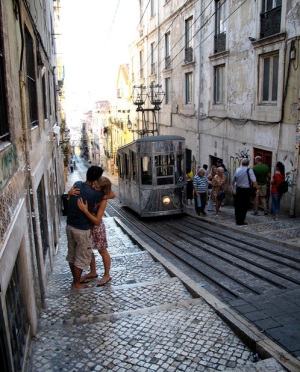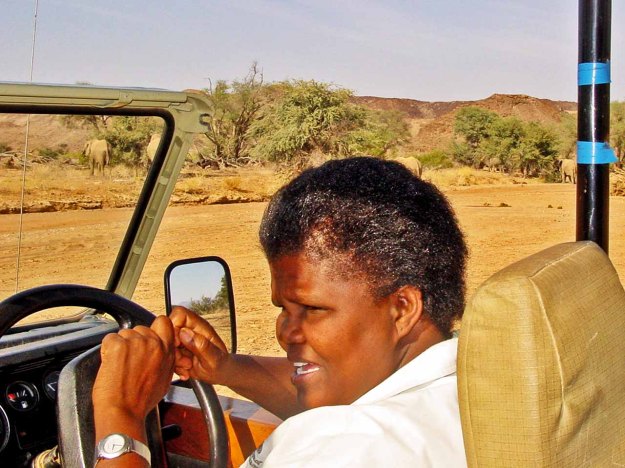 When a building gets old, it decays with gangrene-like progression with every passing year. The last time Mary Mitchell was here, was in her late teens, and even then it was obvious the homestead was dying. It held on, she is sure, for another few years, before its soul departed to leave the skeleton bleached and withered in the merciless heat of the Kalahari. Empty window sockets, staring at nothing, like she used to.
When a building gets old, it decays with gangrene-like progression with every passing year. The last time Mary Mitchell was here, was in her late teens, and even then it was obvious the homestead was dying. It held on, she is sure, for another few years, before its soul departed to leave the skeleton bleached and withered in the merciless heat of the Kalahari. Empty window sockets, staring at nothing, like she used to.
Here, she remembers, was the lounge, with the faded arm chairs and the defiant couch. Defiant, because it held the unfulfilled promise (and temptation) to explore the limits of romantic exploration. Somehow, the ultimate frontier was always a bridge too far. Something would come up: a curious parent, a sniffing dog, a crash of thunder. Even when the carefully-selected suitor came visiting, her father would be there, watching like a hawk. Later, in the year after her father’s death, she found it impossible to close her eyes and let go when the galloping horses of desire reared, hooves clawing the air, white eyes bulging, frightened by the visions of the past.
Romantic exploration… Yes, there was very little of that. The other type was much more common. Romantic destruction. Nowadays, sexual fracking – the abuse of ability and the pollution of purity and beauty…
She closes her eyes. Holds her hands to her ears. Nooo – she doesn’t want to go there, ever again.
Deep breath. Again… Okay.
And here was the dining room. It was a place of simple meals and deep religion. Her father used to read to them every evening. Long passages, starting with January’s Genesis and ending in December with Revelations. She detested these rambling readings of family trees and archaic laws. It seemed so out of place, so mundane, to listen to So-and-so, father of Such-and-such, who had This-and-that with Rebecca. Or Lea. Or whoever.
By August the readings finally got to the New Testament, which is quite old anyway. At least it seemed more contemporary with main characters she at least recognised. And it had a message of love and forgiveness. The sick, the lame, the sinner and the dead each got a new chance in life – which is what she had hoped for, prayed for, for such a long time.
But here…here was her bedroom. The Room of Shame, as she secretly called it back then. This is where she cowered in the dark, hiding under the blanket, when the heavy boots creaked the wooden floorboatds outside her door. This was after the reading and the prayers and the washing up and the normal things happened, like it should in every normal family. This is where normality stopped and shame began.
In the kitchen – now almost gone with not a brick on another – they used to have coffee in the mornings. Her mother, eyes downcast and hands busy preparing breakfast, would mumble a subdued Good Morning and tried to hide the fresh bruises. Her father would stomp in, the cattle rancher inspecting his herd, daring his wife and daughter to say anything. Openly taunting them to challenge his right to use, to abuse, his position as provider and master.
But it is here, in the frame of her bedroom window next to the front door, she’d stand to stare out at the world-out-there. She’d make a conscious effort to note anything positive she could see. A butterfly flitting past would bring a smile. A brigade of hard-working ants scurrying to and fro with bits of grass for the winter pantry, directed her thoughts to a better future. A family of plovers hatched their eggs in the exposed nests they have used since time immemorial, telling her even the most vulnerable lasted longer than the dinosaurs.
It was at this window she closed her eyes, imagining a normal street with normal people doing normal things. Smartly-dressed women and loving couples waltzed by, smiling happily in the afternoon sun. And then she’d open her eyes, staring out to see if God would not, please, send somebody to change circumstances. A person, a catastrophe, a miracle – anything.
This is also the window Boggel used that night, when at last her prayers were answered and the miracle happened.
“This is where I grew up. Long ago, I stood at this window, waiting for you. And, Boggel, even though I didn’t know your name, I knew the day would come that I’d be brave enough to come back, and I’d be able to look through this window again. Only this time, I’d have the courage to look in. In those days I could only look out.”
Mary walks back to her car, carefully avoiding the line of marching ants with their grass-harvest for the winter. Yes, she thinks, a time to gather, and a time to let go. A time to cry and a time for joy. A time to hope for tomorrow – and a time to seize the day.
For the first time in her life, she can smile as she walks away from the house with the Window-of-Hope and the Room-of-Shame. Funny, she thinks, that a window has two sides; somehow both of them give a vision of Freedom, only in different ways. Hope-for-the-future from the inside. A future-of-hope from the outside. The trick is to look through that window, remembering the pane of forgiveness separates the time for mourning in captivity from the time for rejoicing in freedom.
At least, she thinks, that just might be the butterfly her father left behind…

 There hides – in the small hours of the night, especially in the Kalahari – a particular loneliness. It’s carried in the soft night-breeze; it travels with the last tendrils of smoke from the hard-wood embers. It reaches into the vague mistiness between being awake and sliding off to sleep. Those who seek out the vastness of the semi-arid desert on purpose, do so because they need to escape the background noise of the beast we call civilisation. And some – let’s call them accidental visitors – experience this solitude as a world shrinking onto itself, until only the tormented soul and the overwhelming darkness fill the long hours before dawn. Long, cold hours; in which to hold up a mirror of doubt to inspect the deep and private recesses where we normally hate to go. Africa, in the most definite of terms, is not for everybody.
There hides – in the small hours of the night, especially in the Kalahari – a particular loneliness. It’s carried in the soft night-breeze; it travels with the last tendrils of smoke from the hard-wood embers. It reaches into the vague mistiness between being awake and sliding off to sleep. Those who seek out the vastness of the semi-arid desert on purpose, do so because they need to escape the background noise of the beast we call civilisation. And some – let’s call them accidental visitors – experience this solitude as a world shrinking onto itself, until only the tormented soul and the overwhelming darkness fill the long hours before dawn. Long, cold hours; in which to hold up a mirror of doubt to inspect the deep and private recesses where we normally hate to go. Africa, in the most definite of terms, is not for everybody.

 “So why is the Eland so big? And its horns – why are they so small?”
“So why is the Eland so big? And its horns – why are they so small?”




 A place from your past or childhood, one that you’re fond of, is destroyed. Write it a memorial.
A place from your past or childhood, one that you’re fond of, is destroyed. Write it a memorial. !Ka smacks his lips – the coffee is strong and sweet, a special treat after the months of desert-living. The
!Ka smacks his lips – the coffee is strong and sweet, a special treat after the months of desert-living. The  Wherever you go in Africa,
Wherever you go in Africa, 






 The hospital in Upington is like most hospitals you’ve ever been to. The almost-shiny floors, white walls and hushed tones leave you in no doubt that this is a place of hope and despair. Babies are born here. Old people die. It’s the same the world over.
The hospital in Upington is like most hospitals you’ve ever been to. The almost-shiny floors, white walls and hushed tones leave you in no doubt that this is a place of hope and despair. Babies are born here. Old people die. It’s the same the world over.